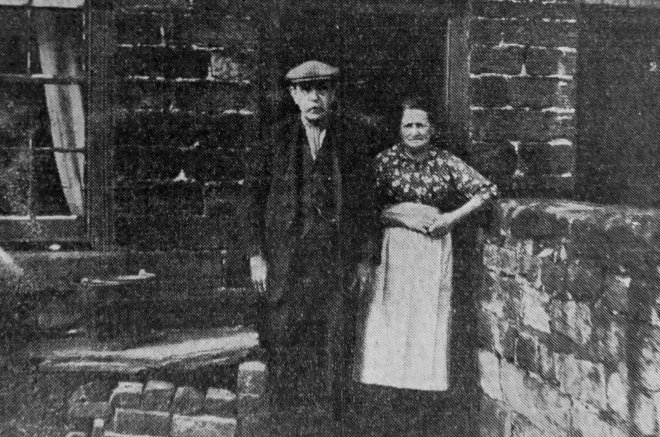Mexborough and Swinton Times February 17, 1939
Old Hemingfield
National Defence in Crimean Days
When Mail Coach Was Robbed
Here’s going back a year or two. It’s an old time story of the village of Hemingfield, incorporating boat building activities at Tingle Bridge and a few odd reminiscences of the days when the mail coach used to rumble through the village night and morning.
The facts are related by Mr. William Gower, the last of Hemingfield’s village blacksmiths, whose family have lived in one house in the village, now 24, Beech House Road, for 187 years.

Mr. and Mrs. W. Gower standing at the door of the Hemingfield cottage which Mr. Gower’s family have occupied for 187 years.
First Tenants.
The first tenants of the cottage were Mr. Gower’s great-great-grandparents, Mr. and Mrs, Blackburn, and they moved in as a young couple when George II was on the throne. The story of old Hemingfield which Mr. Gower carries in his mind is made up of fragments of conversations he s had with his two grandfathers, Mr. Mark Blackburn, who died 51 years ago at the age of 82 and Mr. Joseph Gower, who died 60 years ago at the age of 79.
Mr: Gower has first-hand knowledge of Hemingfield’s mail coach history because in those days his grandfather Gower happened to be the village constable. On its journey from Barnsley to Rotherham and Sheffield the mail coach travelled through Worsborough Dale, Dovecliffe, Jump, Hemingfield and Tingle Bridge, and then by a road which ran past the farm at Rainborough Grange, toward the Cottage of Content. The new road between Tingle Bridge and Lion Lodge had not then been made and the coach had to pass through a quarry near Three Folds Farm. One dark night the coach was held up and robbed in a quarry near the farm which afterwards was always known as “Thief Hole Farm.”
This incident led to Constable Gower being out on the job. When the coach carried valuables it was his duty to meet it as it came into the Wombwell Parish at Dovecliffe, and guard it right through Wombwell territory until it was handed over to another constable at the West Melton boundary. Mr. Gower recalls the names of both the constables his grandfather had to meet in the course of this duty.
In full “war paint” Grandpa Gower must have struck terror in the hearts of malefactors. This was before the days of disarmament. As part of his equipment the constable used to carry a huge sabre with a scythe-like blade and Mr. Gower can clearly recall this weapon hanging on to the sabre a wall of the house. Attached to the sabre was a leather strap which the constable used to sling over his shoulder. “With one swing,” and Mr Gower to our reporter, “he could has taken a man’s head clean off with it
At The Elephant and Castle.
In those days the coach used to stop regularly at the Elephant and castle at Tingle Bridge. There was much excitement at that house when the coach drew in, particularly when the “guard” was on.
Tingle Bridge was then a much more important place and at present. It was indeed more important than Hemingfield.
This is proved by the fact it was able to sustain three public houses – the Elephant and Castle, the Ship (which stood on the canal side), and the Sailors and Miners Arms. The names of these dtwo latter hostelries, now occupied as private houses, had allusion to the time when Tingle Bridge was a hive of boat-building activity.
Turner’s boatyard was then in full swing and many were the launches Mr. Gower watched as a boy. This was always a time for holiday and merrymaking. There was plenty of drink flying about at the three public houses and it was good and cheap. With sixpence a man could get three glasses of beer and half an ounce of tobacco in those days!
Mr. Gower’s great-grandfather was a master brickmaker, and he and his father used to travel from Hemingfield to Great Houghton every day in a donkey-cart. Mr. Gower’s great-grandfather lived to see his hundredth year and at the age of 95 scythed a field of wheat at the back of the cottage for a wager.
Hemingfield Smithy.
Mr. Gower’s grandfather, Mr. Joseph Gower, had a blacksmith’s shop in High Street, Wombwell, opposite where the drapery department of the Barnsley Cooperative Society now stands, and it was because of the better prospects at Hemingfield that he moved here some 60 or 70 years ago to establish a forge where the pathway enters the back of the welfare ground. At that point he was able to get all the smith’s work from the boat yard at Tingle Bridge, in addition to doing all the shoeing work for the farmers and hauliers in that district, which was very considerable in those days. To enter the pathway pedestrians used to climb stone steps near the forge window.
There were then three other blacksmiths shop q Wombwell—one kept by a man named Curtis in a yard containing two old houses opposite the Midland Bank, another kept by Mr. Foulstone on the present site of the Yorkshire Penny Bank and the third in Melville Street.